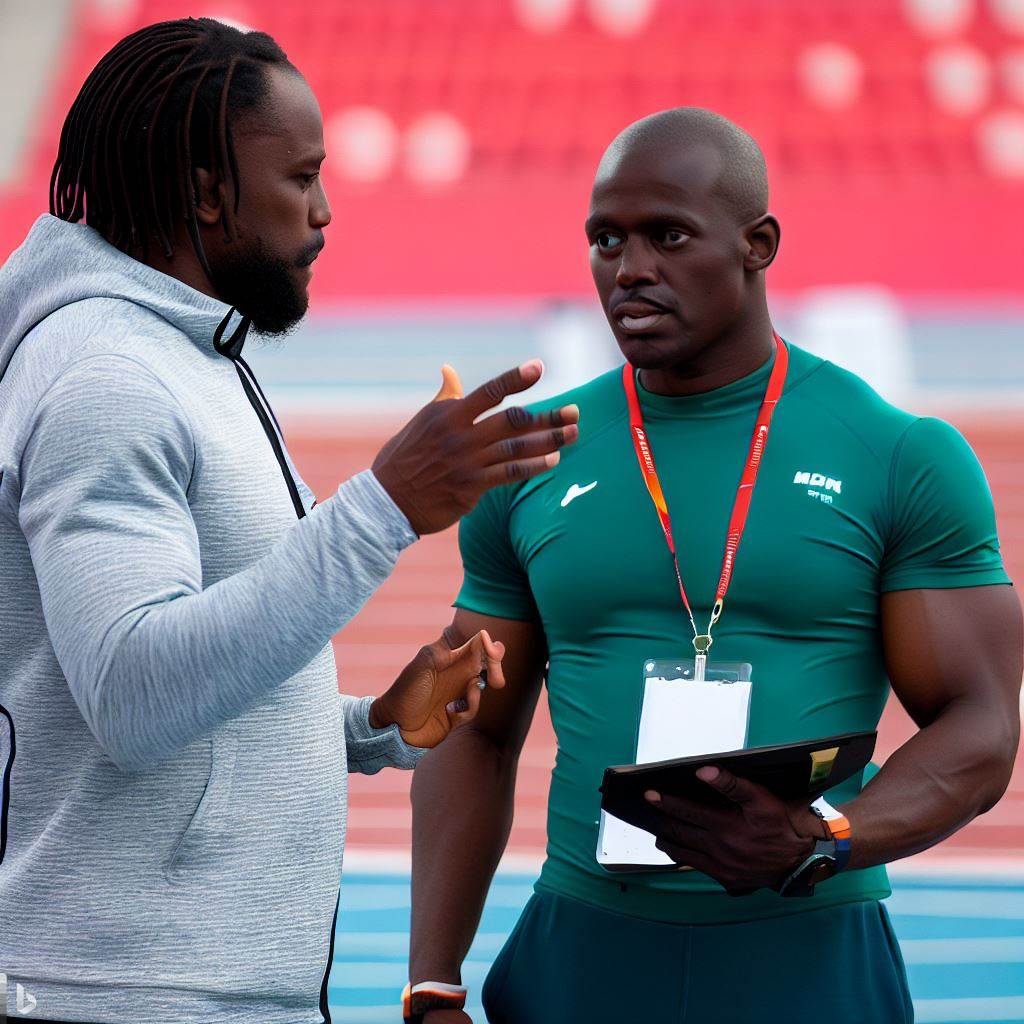Introduction
Assistant Athletic Trainers in Nigeria play a crucial role in supporting athletes with their training and recovery.
Acquiring proper training and certification is important for Assistant Athletic Trainers in Nigeria to provide quality care.
The purpose of this blog post is to guide aspiring Assistant Athletic Trainers in Nigeria on available courses.
- Assistant Athletic Trainers in Nigeria are crucial in ensuring athletes’ well-being, performance, and recovery.
- They work alongside athletes, addressing injuries, implementing conditioning programs, and providing essential healthcare support.
The Significance of Acquiring Proper Training and Certification
- Proper training equips athletic trainers with essential knowledge and skills for effective athlete care.
- Certification validates their expertise, fostering trust among athletes, coaches, and organizations.
- Quality training and certification enhance career opportunities and professional growth.
- It ensures adherence to global standards, promoting safer and more efficient sports healthcare practices in Nigeria.
Purpose of This Blog Post
- This blog post aims to guide aspiring assistant athletic trainers in Nigeria toward the right courses and certifications.
- We’ll explore the training options available and the importance of choosing the right path to excel in this essential role.
- Join us as we navigate the educational landscape for assistant athletic trainers in Nigeria, helping you pave the way to a successful career in sports healthcare.
Overview of Assistant Athletic Trainer courses in Nigeria
Current availability of courses
In Nigeria, individuals interested in becoming Assistant Athletic Trainers can access multiple courses. These courses focus on delivering comprehensive training and education in sports medicine.
Various universities and colleges across the country offer the highly sought-after Bachelor’s degree program in Athletic Training.
This program provides students with the necessary knowledge and skills to work as Assistant Athletic Trainers.
Recognition and accreditation of the courses
The Assistant Athletic Trainer courses in Nigeria are recognized and accredited by the appropriate governing bodies, such as the Nigerian Universities Commission and the National Board for Technical Education.
These accreditations ensure that the courses meet the required standards and provide quality education.
Furthermore, the courses are recognized by professional organizations, such as the National Athletic Trainers’ Association, which enhances the credibility and reputation of the programs.
Importance of choosing an accredited program
Choosing an accredited program is of utmost importance for individuals aspiring to pursue a career as an Assistant Athletic Trainer in Nigeria.
Accreditation ensures that the courses meet the necessary standards and provide a high-quality education.
By enrolling in an accredited program, students can be confident that they are receiving the appropriate knowledge and skills required to excel in their profession.
It also enhances their chances of securing employment, as employers often prefer candidates who have completed accredited programs.
Accredited programs also offer several benefits, such as access to experienced faculty members and advanced facilities, which enhance the learning experience.
Additionally, they provide opportunities for internships and placements, allowing students to gain practical experience in real-world settings.
In a nutshell, Assistant Athletic Trainer courses in Nigeria are widely available and recognized by the appropriate governing bodies and professional organizations.
Choosing an accredited program is crucial to ensure a high-quality education and increase employment prospects.
Read: Understanding the Role of Coaches in Nigerian Sports
Key components of Assistant Athletic Trainer courses
Theoretical knowledge and principles
- Anatomy and physiology
- Injury prevention and common sports injuries
- Rehabilitation techniques
- Sports nutrition and conditioning
Practical skills development
- Hands-on experience with taping and wrapping techniques
- Injury assessment and on-field emergency response
- Rehabilitation exercises and modalities
- Sports event coverage and management
Assistant Athletic Trainers play a crucial role in the overall well-being and performance of athletes.
These healthcare professionals work under the supervision and guidance of certified athletic trainers to provide preventive and rehabilitative care to athletes.
In Nigeria, there is an increasing demand for qualified assistant athletic trainers to support the growing sports industry.
To meet this demand, various courses are available that equip aspiring trainers with the necessary skills and knowledge.
The key components of Assistant Athletic Trainer courses in Nigeria can be broadly categorized into theoretical knowledge and principles and practical skills development.
Theoretical knowledge and principles
- Anatomy and physiology: Assistant Athletic Trainers need a strong understanding of the human body to assess and treat injuries effectively. Courses cover topics such as musculoskeletal anatomy, cardiovascular function, and exercise physiology.
- Injury prevention and common sports injuries: Assistant Athletic Trainers are trained in recognizing and preventing sports-related injuries. They learn about various sports injuries, their causes, and methods to reduce the risk of injuries through proper conditioning and training techniques.
- Rehabilitation techniques: Assistant Athletic Trainers learn different rehabilitation techniques to help athletes recover from injuries. These techniques include therapeutic exercises, manual therapy, and the use of modalities such as heat, cold, and electrical stimulation.
- Sports nutrition and conditioning: Proper nutrition and conditioning play a vital role in an athlete’s performance and recovery. Courses for Assistant Athletic Trainers include tailored topics: sports nutrition, dietary planning, and athlete-specific conditioning programs
Practical skills development
- Hands-on experience with taping and wrapping techniques: They learn taping, wrapping for injured joint and muscle support as Assistant Athletic Trainers. They learn how to properly apply athletic tape and bandages to prevent further injury and promote healing.
- Injury assessment and on-field emergency response: They assess injuries, give prompt care as Assistant Athletic Trainers on-field. They learn how to identify and manage different types of injuries, including fractures, sprains, and concussions.
- Rehabilitation exercises and modalities: Assistant Athletic Trainers gain practical experience in designing and implementing rehabilitation exercises specific to each athlete’s injury. They learn how to use various rehabilitation modalities, such as ultrasound and electrical stimulation, to accelerate the healing process.
- Sports event coverage and management: Assistant Athletic Trainers learn how to provide medical coverage during sports events. They gain skills in managing emergency situations, developing emergency action plans, and coordinating with other medical professionals to ensure the safety of athletes.
Generally, Assistant Athletic Trainer courses in Nigeria aim to provide aspiring trainers with a solid foundation of theoretical knowledge and practical skills.
By equipping them with the necessary tools, these courses ensure that assistant athletic trainers can effectively contribute to the well-being and performance of athletes in Nigeria’s sports industry.
Read: A Close Look at the Nigerian Professional Sports Infrastructure

Options for Assistant Athletic Trainer courses in Nigeria
Aspiring assistant athletic trainers in Nigeria have multiple options when it comes to pursuing relevant courses.
Whether they prefer a traditional classroom-based approach or the flexibility of online learning, there are opportunities available to cater to different preferences and schedules.
Traditional classroom-based courses
1. Universities and colleges offering relevant programs
Structured learners can opt for assistant athletic trainer courses at universities and colleges, a rewarding choice.
Nigerian academic institutions provide tailored programs to equip students with athletic training knowledge and skills effectively.
These programs are typically offered by departments or faculties within the fields of sports science, kinesiology, or physical education.
2. Duration and structure of these courses
Course duration and structure for assistant athletic trainers in traditional classrooms vary based on programs and institutions
Some courses may span a few semesters, while others may be completed within a year. The curriculum often includes theoretical instruction, practical training, and hands-on experience through internships or clinical placements.
Students can expect to cover topics such as anatomy, injury prevention, rehabilitation techniques, emergency care, and athlete wellness.
Online courses and certifications
1. Benefits and convenience of online learning
Growing in popularity, online learning offers flexibility and convenience, ideal for those with commitments or limitations hindering traditional class attendance.
Enrolling in online courses allows aspiring assistant athletic trainers to study at their own pace and schedule, making it easier to balance other responsibilities.
This mode of learning also eliminates the need for physical attendance, making it accessible to students residing in remote areas or with limited transportation options.
2. Online platforms that offer Assistant Athletic Trainer courses
Diverse online platforms offer Assistant Athletic Trainer courses and certifications, enabling skill acquisition independent of location or time.
These platforms often collaborate with reputable institutions or industry professionals to develop and deliver comprehensive curriculum. They employ interactive learning methods, such as video lectures, discussion forums, and virtual simulations, to ensure students receive a well-rounded education in athletic training.
Some platforms also offer certification exams upon completion of the course, further enhancing the credibility of the acquired knowledge and skills.
Essentially, prospective assistant athletic trainers in Nigeria have multiple options to pursue their career goals. Traditional classroom-based courses offered by universities and colleges provide a structured and comprehensive approach, while online courses offer flexibility and convenience through accessible platforms.
Whether individuals prefer the traditional or modern mode of learning, they can find suitable courses that equip them with the necessary knowledge and skills to excel in the field of athletic training.
Read: Training Programs for Aspiring Athletes in Nigeria
Finding the right Assistant Athletic Trainer course
Factors to consider when choosing a course
- Accreditation and Recognition.
- Course curriculum and modules
- Faculty qualifications and experience
- Practical training opportunities
Researching and comparing different courses.
- Gathering information from reputable sources
- Reading student reviews and testimonials
- Seeking advice from professionals in the field
Selecting the right course for Assistant Athletic Training in Nigeria is pivotal for a strong foundation. Consider accreditation, curriculum, faculty expertise, and practical training.
Accreditation assures recognized education standards. The curriculum should encompass injury prevention, rehabilitation, and emergency procedures.
Expert faculty and their industry connections enhance learning. Practical experience builds skills and confidence.
Research courses, gather information from reputable sources, read student reviews, seek professional advice. Make an informed decision for a successful athletic training career.
Read: The Rise of Nigerian Athletes on the Global Stage
Conclusion
Recap of the importance of Assistant Athletic Trainer courses in Nigeria
Assistant Athletic Trainer courses in Nigeria play a crucial role in developing competent professionals who can provide essential support to athletes.
These courses equip individuals with the necessary knowledge and skills to deal with injuries, prevent them, and optimize the performance of athletes.
Encouragement to pursue proper training and certification
For aspiring Assistant Athletic Trainers in Nigeria, pursuing proper training and certification is highly recommended.
It not only enhances job prospects but also ensures that they are well-prepared to handle the physical demands and challenges of the profession.
Training and certification also provide individuals with a competitive edge in the market.
Final thoughts and takeaway point
Assistant Athletic Trainer courses in Nigeria are of great significance in promoting athlete welfare and performance.
By enrolling in these courses, individuals can acquire the necessary skills and knowledge to excel in this field.
Certification enables opportunities, fostering Nigerian sports growth and development through proper training




